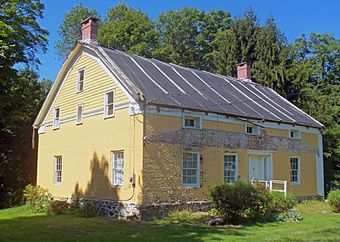Andries DuBois House facts for kids
Quick facts for kids |
|
|
Andries DuBois House
|
|

West profile and south elevation, 2012
|
|
| Location | Wallkill, NY |
|---|---|
| Nearest city | Newburgh |
| Built | 1814 |
| Architectural style | Colonial |
| NRHP reference No. | 98001011 |
| Added to NRHP | 1998 |
The Andries DuBois House is a historic home in Wallkill, New York, USA. It's the oldest house in this small community, called a hamlet. This special house shows different building styles and tells a lot about the area's history. Since 1998, it has been listed on the National Register of Historic Places, which means it's an important historical site.
Contents
Discovering the Andries DuBois House
This house was built by Andries DuBois. He was a descendant of the original Huguenot families who settled nearby in New Paltz. The DuBois family built this house and farmed the land near the Wallkill River. For a long time, people thought the house was built in the mid-1700s.
A Look Back in Time
However, some parts of the house looked newer. For example, it has a special roof called a gambrel roof. It also has unique eyebrow windows and a full front porch. The walls switch between brick and wood. These features made experts think the house was built later or changed a lot over time.
In 1998, the Historical Society of Shawangunk and Gardiner bought the house. They received a special grant (money) in 2003. This money helped them study the house's history and structure.
What the Experts Found
Experts examined the wooden beams used to build the house. At first, they thought the house was built in 1769. But they found something interesting. The wood and the soil around the house had layers of charcoal. This was a sign of a big fire that happened long ago.
Further study showed that a fire destroyed most of the original house. But some strong wooden parts were still good. These parts were reused when the current house was built in 1814. Later, in 1845, the entrance, windows, and porch were updated. These changes followed the popular Greek Revival style of that time. The current porch was rebuilt again in 1981, using older materials.
What the Dig Found
During the study, archaeologists also dug around the house. They found many old items. These included American coins from the early 1800s, a comb, and even a child's doll! They also found stone tools like a quartz scraper. These tools suggest that Native American people lived on this land before the house was built.
The House Today
The Historical Society is now fixing up the Andries DuBois House. It had become a bit run-down over the years. They are getting help from local donations and a grant from the State Historic Preservation Office. Once it's finished, the house will become a local history museum. It will be a place where everyone can learn about the past of Wallkill.
 | Emma Amos |
 | Edward Mitchell Bannister |
 | Larry D. Alexander |
 | Ernie Barnes |

